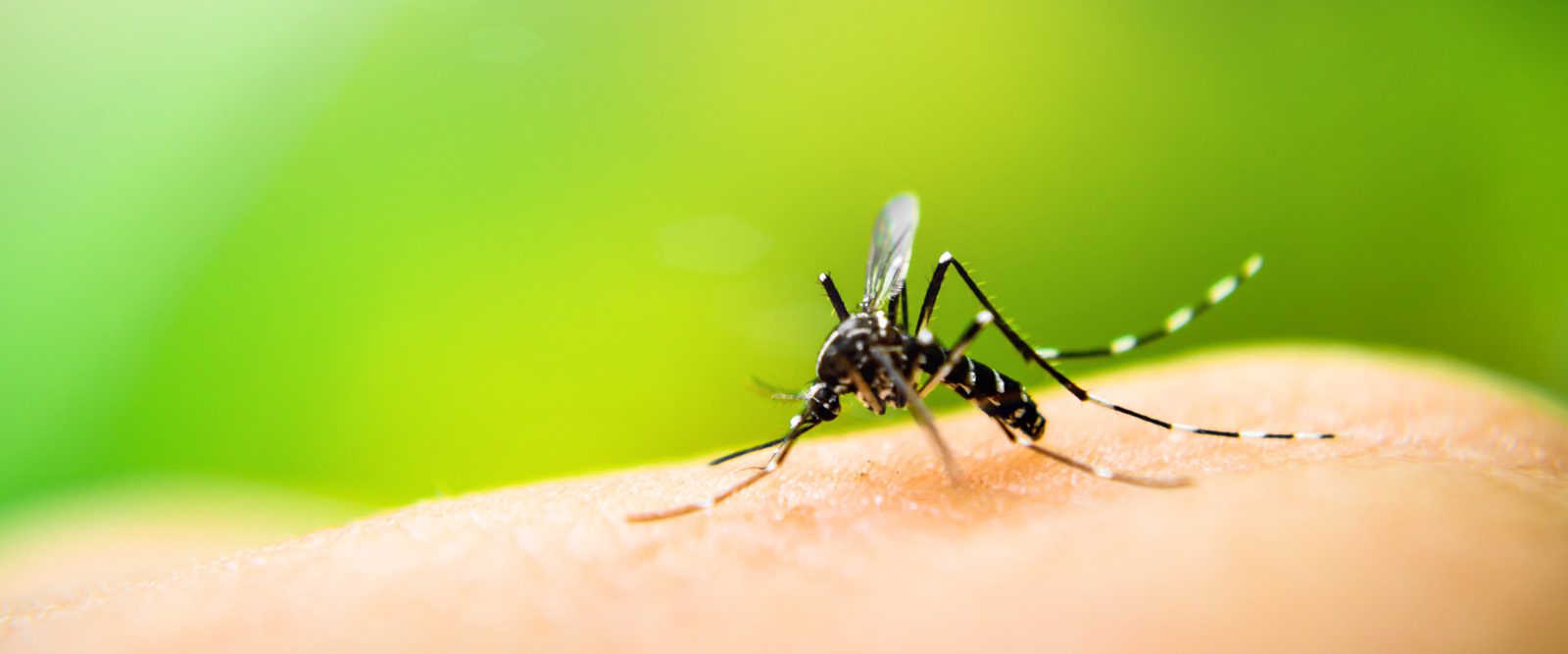What to Know About Mosquito-Borne Diseases
An infectious disease expert discusses diseases spread by mosquitoes including West Nile virus and Eastern equine encephalitis, the symptoms to watch for, and how to avoid getting bitten.

With the U.S. in peak mosquito season, health officials are warning people to take extra precautions against mosquito-borne diseases. While the risk of becoming seriously ill from a mosquito bite is low, it can happen.
Every year, cases of West Nile virus are reported across the country. As of this week, 33 states have reported human cases of West Nile, according to the Centers for Disease Control and Prevention (CDC), and Dr. Anthony Fauci, the nation’s former top infectious disease expert, recently shared he is recovering after being hospitalized from the virus. In addition, rare cases of Eastern equine encephalitis (EEE) in the Northeast have prompted some health officials to close public parks from dusk until dawn when the mosquitoes are most active.
“Mosquito bites can be more than a mere annoyance, so it’s important to focus on deterring mosquitoes and preventing bites,” says Dr. Laura Kirkman, an infectious disease doctor at NewYork-Presbyterian/Weill Cornell Medical Center. “Apply mosquito repellant before you go outside and consider wearing clothes that will keep the bugs away, like long sleeves or light pants. If you have a baby under 2 months old, you can put mosquito netting or a light blanket over the stroller.”
Dr. Kirkman shared more with Health Matters about mosquito-borne diseases, including why mosquitoes bite, and what to do if you get bitten.

Dr. Laura Kirkman
How worried should we be about West Nile virus?
Dr. Kirkman: West Nile virus is the most common mosquito-borne disease in the U.S. It is seen all over the country, including urban areas, because the mosquitoes that carry it can thrive in any stagnant water. Most people — approximately 80% — who get infected do not develop symptoms, but for those that do it can be quite serious and require medical care.
There is no person-to-person transmission of West Nile. Mosquitoes carry the virus to humans after they bite a bird or another animal. Also, there are no vaccines, so bite prevention is the only way to avoid infection.
What about Eastern equine encephalitis?
Eastern equine encephalitis (EEE) is more often seen closer to forested wetland or swamp environments, primarily in the Southeast, Northeast and the Great Lakes regions. It is transmitted by a different kind of mosquito which likes to live mostly around bogs and swamps.
EEE is rare, but it can be quite serious. There have been sporadic cases every year with periodic outbreaks that drive up the numbers. Like West Nile, mosquitos that feed on birds and other animals are the ones transmitting EEE — it is not contagious from person to person. And taking precautions to prevent bites is the best way to stay safe because there are no vaccines.
What are the symptoms of West Nile or EEE?
The vast majority of people who are bitten by a mosquito with West Nile or EEE will not become seriously ill.
People who do become ill will start to have symptoms four to 15 days after a bite. The early signs are fever, chills, headache, and muscle and joint aches. The more worrisome symptoms are seizures, behavioral changes, drowsiness and coma, which could mean that the virus has moved into the central nervous system and can cause encephalitis or meningitis (inflammation of the membrane around the brain or of the spinal cord). But this is extremely rare.
What normally happens after a mosquito bites you?
When mosquitoes probe around in your skin, they’re putting saliva into your body, and you react to the protein in the saliva. Usually a puffy and red bump will appear a few minutes after the bite. How big the welt is varies from person to person, especially because some people have allergic reactions. If the welt continues to get bigger, redder, and hot after five to seven days, it could be a sign of a bacterial infection called cellulitis, and antibiotics might be needed to treat it.
Which repellents do you recommend?
Most of the products you find in the store contain DEET or picaridin. Both are safe to use. The sprays work for ticks as well, so if you live in an area with ticks, it’s doubly beneficial. You can learn more about different repellents through the Environmental Protection Agency (EPA) search tool. There’s a lot of fear about repellents, particularly with DEET, but if you don’t apply them when you go outside, you are going to have an increased risk of bug bites. Try to stick to the EPA-approved repellants so that you can have long-lasting protection.
What other advice do you have for reducing risk when it comes to mosquitoes?
Eliminating standing water around your home — for example in birdbaths or empty planters — is a good idea, as it can serve as a breeding ground for mosquitoes. Using screened windows and doors is also very important.
What is the best way to treat a mosquito bite?
Most mosquito bites will swell and itch for a day or two and then get better over time. Try not to scratch them, as you do not want to break the skin. To reduce the swelling, apply an ice pack to the site, and for itching, a mixture of baking soda and water will help, or you can apply an over-the-counter anti-itch or antihistamine cream.
Is it true that some people are mosquito magnets?
There is scientific evidence that mosquitoes are drawn to certain chemicals present in human body odor. A significant new study on the African malaria mosquito found that mosquitoes are sensitive to the scent of organic compounds on the skin. The study also found that mosquitoes are repelled by eucalyptol, which is present in a variety of plants we eat (for example, rosemary, sage, and cardamom), toothpaste, and cough medicines. However, eucalyptol is not the optimal repellant. To prevent bites, use the EPA-approved repellants and other prevention methods like staying indoors during prime biting hours.
The Differences Between Mosquito-Borne Diseases
Here are common diseases spread by mosquitos and how to treat them.
Eastern equine encephalitis
What is it?
Eastern equine encephalitis (EEE) is an extremely rare but serious infection. Since 1971, only 11 people in New York State have been diagnosed with the virus.
What are the risks?
People over age 50 and younger than 15 are at greatest risk for developing severe disease. In rare cases, it can result in encephalitis, a fatal infection that causes inflammation of the brain.
What are the symptoms?
The majority of people will not develop symptoms. For those who do, the time from the bite to the onset of illness ranges from four to 10 days. Most people will experience fever, chills, body aches and joint pain for one to two weeks and then recover. In rare cases, it can lead to brain inflammation, neurological damage, coma or death.
What are the treatments?
There are no vaccines to prevent EEE or medicines to treat it. Rest, fluids and over-the-counter medicines can relieve symptoms.
Dengue
What is it?
Dengue is one of the most prevalent mosquito-borne diseases worldwide; each year up to 400 million people are infected with dengue virus. Outbreaks in the U.S. have been relatively small and limited and mainly occur in travelers infected elsewhere.
What are the risks?
Dengue causes mild to severe illness and can be a medical emergency. Those at highest risk are travelers to countries with high transmission, infants, and pregnant women. If you have had dengue in the past, you may also be more likely to develop severe dengue.
What are the symptoms?
The most common is fever with nausea, rash, or joint aches. Severe dengue signs appear 24 to 48 hours after the fever is gone and include belly pain, vomiting, or bleeding from the nose or gums.
What are the treatments?
There is no treatment, so take acetaminophen to control fever and relieve pain. Symptoms typically last two to seven days, and most people recover after about a week. If you have symptoms of severe dengue, go to the emergency department immediately.
Malaria
What is it?
Malaria is caused by parasites that are transmitted to humans through bites of a specific kind of mosquito. In 2020, nearly half of the world’s population was at risk of malaria, and the majority of cases and deaths in sub-Saharan Africa.
What are the risks?
Malaria is a serious and potentially life-threatening disease if it is not diagnosed and treated promptly. The groups at higher risks are infants, children under 5, pregnant women, people who are immunocompromised, and travelers coming from areas with high transmission of malaria.
What are the symptoms?
Fever is the most common symptom, along with fatigue, headaches, and nausea. The symptoms of malaria appear around a month after the bite, because the life cycle of the parasite goes through different developmental stages before an infected person has symptoms. More severe symptoms are difficulty breathing, confusion, and seizures.
What are the treatments?
Malaria is treatable. Anyone who has symptoms should see a doctor and take a blood test. Doctors will recommend a treatment based on the type of species of the parasite, symptoms, and travel history. Before going to countries where malaria is present, talk to the doctor about malaria prevention medications.
West Nile
What is it?
West Nile virus is the most common mosquito-borne illness in the U.S. Cases usually appear at the start of the summer and continue through the fall.
What are the risks?
Most people are at a low risk of becoming sick. In rare cases, West Nile can lead to serious illnesses that affect the brain and spinal cord, including encephalitis, meningitis, or acute flaccid paralysis, which is a polio-like syndrome where muscles become weak or paralyzed. The people at highest risk are immunocompromised or older than 60.
What are the symptoms?
Symptoms of West Nile are usually mild to moderate — for example, fever, body aches, or vomiting. They appear within three to 15 days after a bite by an infected mosquito. If the virus becomes more serious, it can cause symptoms like confusion, muscle weakness, or numbness.
What are the treatments?
There is no vaccine or treatment for West Nile, so an over-the-counter medication, like acetaminophen, is the best option for helping to relieve symptoms. A recovery from illness can take weeks, and in serious cases months or longer.
Zika
What is it?
Zika is primarily spread through the bite of infected mosquitoes. It is possible for a pregnant woman to pass Zika to the fetus during pregnancy or birth, and Zika can also be sexually transmitted.
What are the risks?
Most people are at a low risk of becoming seriously ill from Zika. However, an infection during pregnancy can cause birth defects.
What are the symptoms?
Common symptoms are mild, such as fever, rash, headache, and joint pain. They usually last several days to a week.
What are the treatments?
There is no vaccine or treatment for Zika. Over-the-counter medications, such as acetaminophen, can reduce fever and pain.

